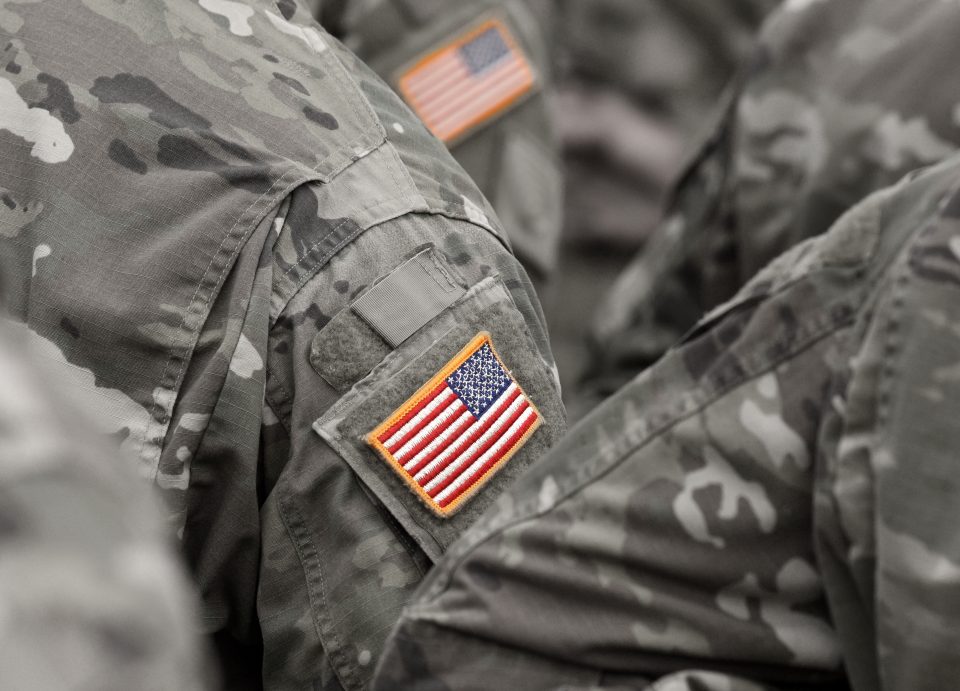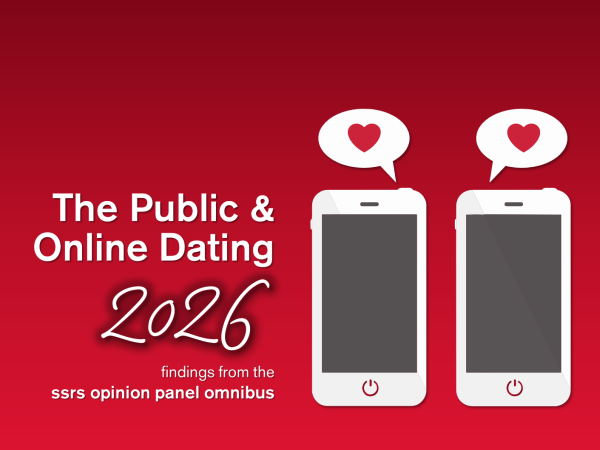A new SSRS Opinion Panel Omnibus poll asked Americans, including an oversample of veterans, about support for military veterans after they leave their service.
We also conducted a series of one-on-one in-depth qualitative interviews with veterans in our panel to hear their reflections on the poll results.
The poll finds:
- About two in five U.S. adults (42%) believe that the U.S. cares for its veterans very (7%) or somewhat well (35%) after they leave military service. In contrast, about two-thirds (66%) of veterans themselves believe veterans are taken care of very (21%) or somewhat well (45%).
- Nine in ten U.S. adults (90%), including 96% of veterans and 89% of non-veterans, believe it is extremely or very important for the federal government to provide support for veterans, such as health care, job training, or housing assistance.
- U.S. adults believe access to quality health care (35%) and mental health support (31%) should be the federal government’s highest priorities for supporting veterans. Nearly half (48%) of veterans choose access to quality health care as the highest priority, while non-veterans are about equally likely to name access to quality health care (34%) and mental health support (32%).
- When U.S. adults were asked in an open-ended question how they think individuals and communities can support veterans, beyond thanking them for their service, responses revealed notable differences between veterans and nonveterans, shaped by their own experiences and perspectives.
These findings are part of an SSRS Opinion Panel Omnibus poll conducted October 3 – 5, 2025, among a nationally representative sample of 1,144 adults aged 18 and older, including an oversample of veterans. Approximately six percent of U.S. adults have ever served on active duty in the U.S. Armed Forces, Reserves, or National Guard. The qualitative in-depth interviews were conducted over Zoom with four veterans from the Panel.
How well does the public believe the U.S. takes care of its veterans?
About two in five U.S. adults (42%) believe that the U.S. cares for its veterans very (7%) or somewhat well (35%) after they leave military service. In contrast, about two-thirds (66%) of veterans themselves believe veterans are taken care of very (21%) or somewhat well (45%).

Republicans (59%) are more likely than Democrats (35%) or Independents (37%) to believe veterans are well cared for. Adults aged 65 or over (50%) are more likely than adults aged 18-49 (39%) to have this positive view.
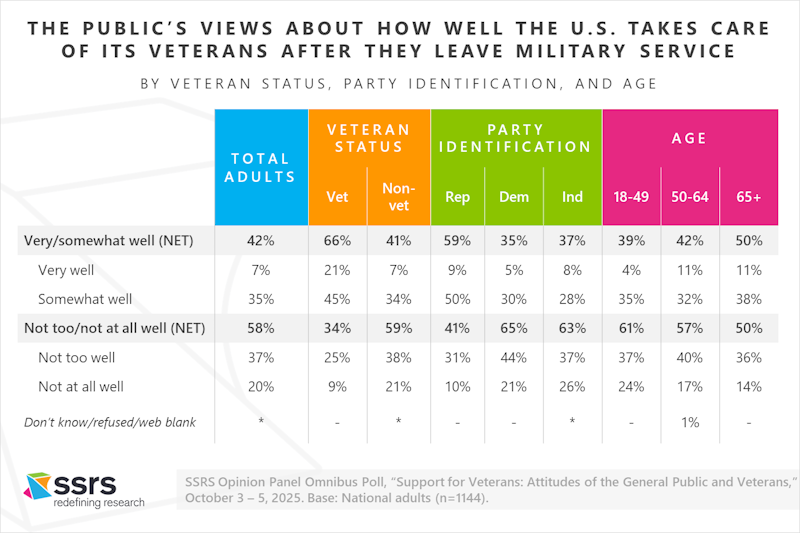
How important do U.S. adults believe it is for the federal government to provide support to veterans?
Nine in ten U.S. adults (90%), including 96% of veterans and 89% of non-veterans, believe it is extremely or very important for the federal government to provide support for veterans, such as health care, job training, or housing assistance.

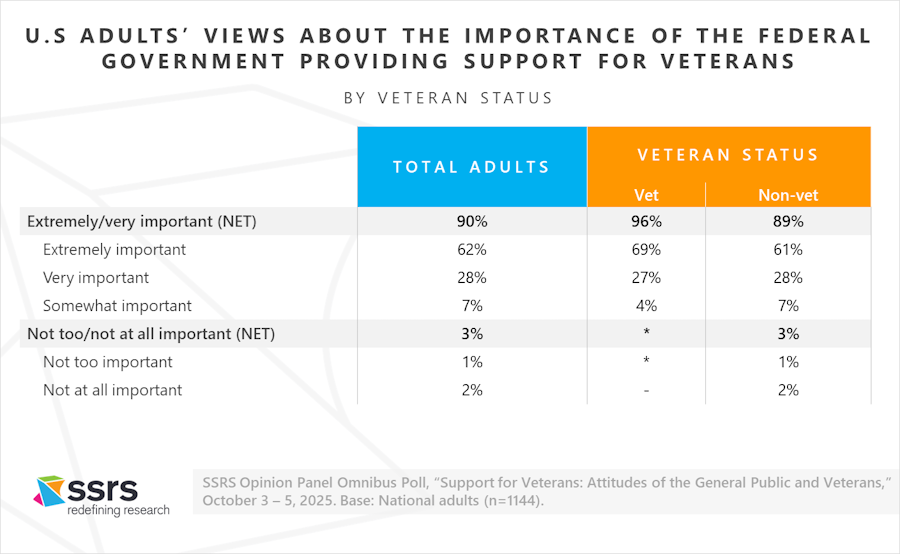
What do U.S. adults believe should be the federal government’s highest priority for supporting veterans?
The new SSRS Opinion Panel Omnibus poll also finds that U.S. adults believe access to quality health care (35%) and mental health support (31%) should be the federal government’s highest priorities for supporting veterans. Nearly half (48%) of veterans choose access to quality health care as the highest priority, while non-veterans are about equally likely to name access to quality health care (34%) and mental health support (32%).

Among U.S. adults overall, men (40%) are more likely than women (31%) and adults aged 50-64 (41%) and 65 or over (45%) are more likely than those aged 18-49 (28%) to say access to quality health care is most important. Among adults aged 18-49, mental health services are the highest priority (34%).
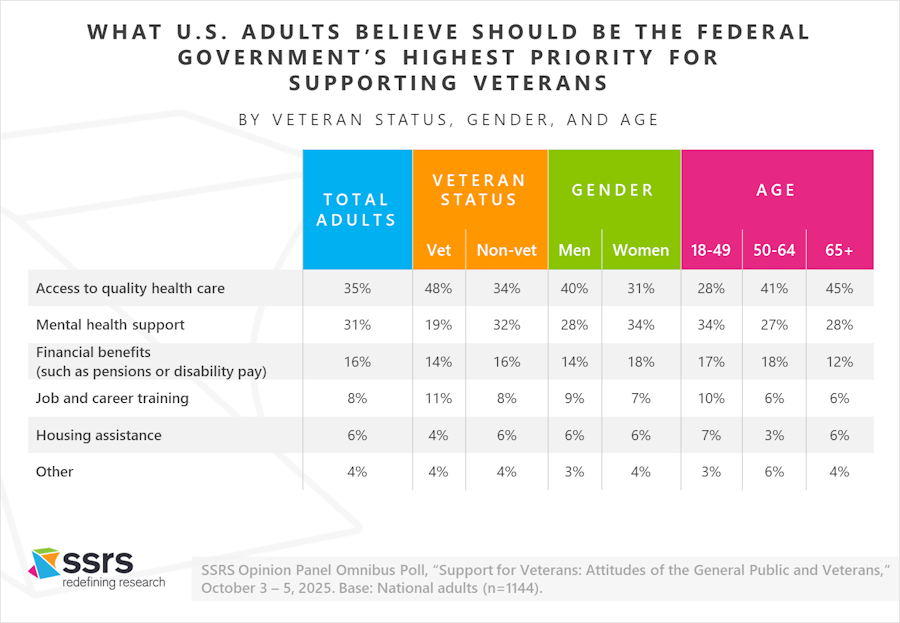
In what ways do U.S. adults think individuals and communities can support veterans?
When U.S. adults were asked in an open-ended question how they think individuals and communities can support veterans, beyond thanking them for their service, responses revealed notable differences between veterans and nonveterans, shaped by their own experiences and perspectives..
Veterans were most likely to mention providing practical support and services, as well as advocacy and political action as ways individuals and communities can support veterans. On the other hand, non-veterans were most likely to mention recognition and appreciation beyond words, as well as personal interaction and social support. Veterans and non-veterans both mention respect and kindness or compassion as ways individuals and communities can support veterans.

Veterans’ other top mentions were community involvement and volunteering, as well as facilitating civilian transition. Non-veterans’ other top mentions were support through community resources and advocacy and government responsibility.
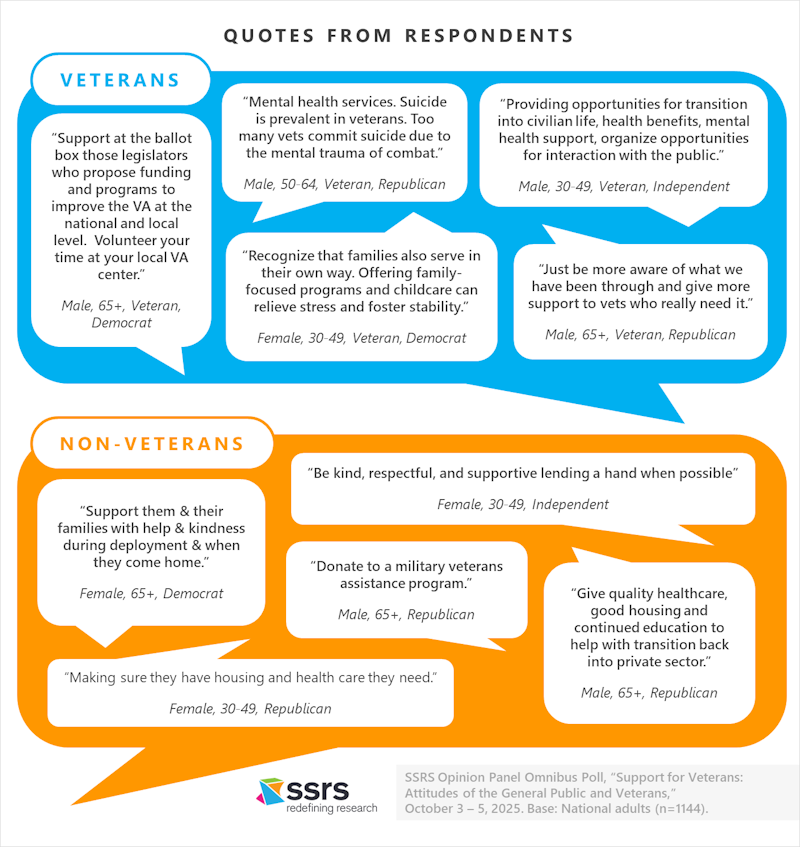
In-Depth Qualitative Interviews with Veterans on the SSRS Opinion Panel
Methodology
This survey was conducted on the SSRS Opinion Panel Omnibus on October 3 – 5, 2025, among a nationally representative sample of 1,144 adults aged 18 and older, including an oversample of veterans. The margin of error for total respondents is +/-3.4 percentage points at the 95% confidence level. The design effect is 1.39.
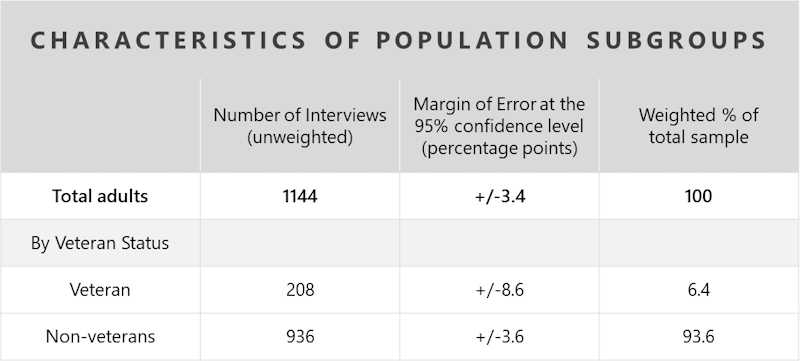
Qualitative in-depth interviews were conducted with four panelists who had served in the U.S. military and who agreed to take part in a 30-minute interview over Zoom with a SSRS researcher.
The SSRS Opinion Panel Omnibus is a multi-client, probability-based survey that fields twice a month. It delivers a nationally representative sample of 1,000 adults aged 18 or older in English (with Spanish language option). Data collection is conducted online and via phone (for non-internet and web-reluctant respondents) using the probability-based SSRS Opinion Panel.
All SSRS Opinion Panel Omnibus data are weighted to represent the target population of U.S. adults ages 18 or older. View the questions used for this analysis, along with the responses (topline).
The SSRS Opinion Panel Omnibus is conducted on the SSRS Opinion Panel. SSRS Opinion Panel members are recruited randomly based on a nationally representative ABS (Address Based Sample) design (including Hawaii and Alaska). ABS respondents are randomly sampled by Marketing Systems Group (MSG) through the U.S. Postal Service’s Computerized Delivery Sequence File (CDS), a regularly updated listing of all known addresses in the U.S. For the SSRS Opinion Panel, known business addresses are excluded from the sample frame.
The SSRS Opinion Panel is a multi-mode panel (web and phone). Most panelists take self-administered web surveys; however, the option to take surveys conducted by a live telephone interviewer is available to those who do not use the internet as well as those who use the internet but are reluctant to take surveys online. All sample drawn for this study were SSRS Opinion Panelists who are U.S. adults ages 18 or older. Sample was selected to ensure representation by age, gender, race and ethnicity, education, Census region, and party identification. Possible sources of non-sampling error include non-response bias, as well as question wording and ordering effects.
